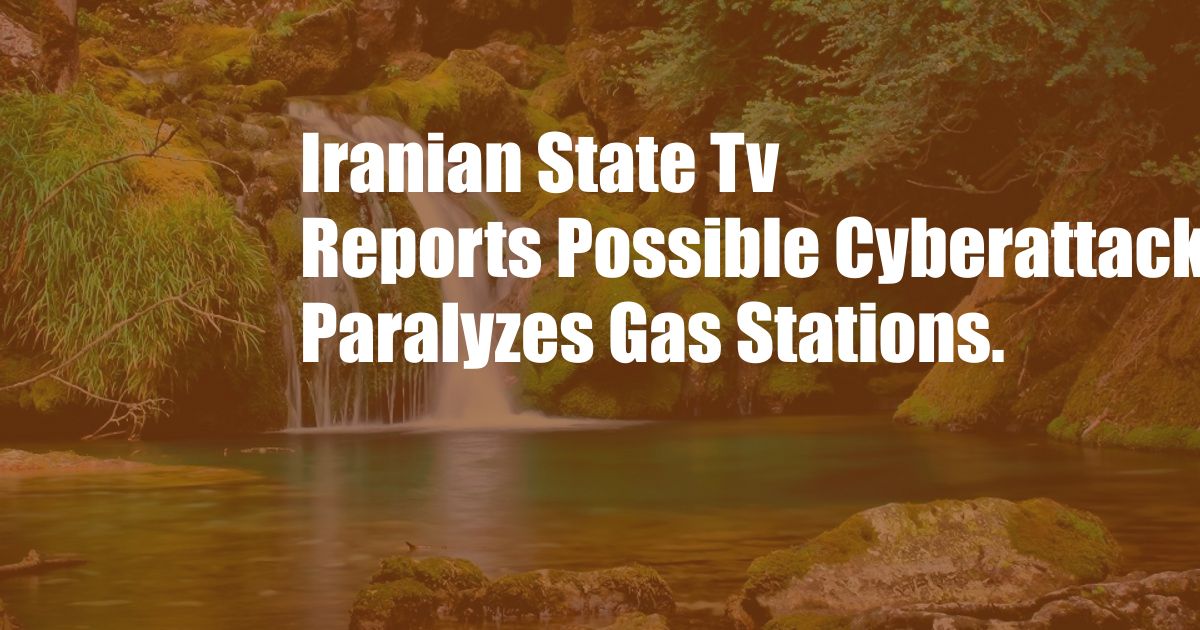
Iranian State TV Reports Possible Cyberattack Paralyses Gas Stations
In a recent turn of events, Iranian state television reported a possible cyberattack that has disrupted several gas stations across the country. The incident left numerous motorists stranded and unable to refuel their vehicles, raising concerns about the country’s critical infrastructure security.
The attack, believed to have occurred on Tuesday, has prompted investigations by Iranian authorities, including the Cyber Security Headquarters of the Iranian Armed Forces and the National Security Council. Preliminary findings suggest a coordinated effort involving remote access to the gas stations’ computer systems, resulting in the disruption of fuel dispensing software.
Cyberattacks on Critical Infrastructure: A Growing Threat
This incident highlights the increasing threat of cyberattacks on critical infrastructure worldwide. Critical infrastructure includes essential services such as energy, transportation, water, and telecommunications, which are vital to the functioning of modern society. Cyberattacks on these systems can have devastating consequences, disrupting essential services and causing widespread chaos.
In recent years, there have been numerous high-profile cyberattacks on critical infrastructure. In 2021, a ransomware attack on Colonial Pipeline, a major U.S. fuel pipeline, caused widespread fuel shortages and panic buying. Similarly, in 2015, a cyberattack on Ukraine’s power grid left hundreds of thousands of people without electricity for several hours. These incidents underscore the urgency of addressing cyber threats to critical infrastructure.
Understanding the Cybersecurity Landscape in Iran
Iran has been a target of numerous cyberattacks, including the infamous Stuxnet attack in 2010, which was widely attributed to the United States and Israel. Iran has since invested heavily in its cyber capabilities and has developed sophisticated offensive and defensive capabilities. Despite these efforts, the country remains vulnerable to cyberattacks, as evidenced by the recent incident involving the gas stations.
The Iranian government has been accused of sponsoring cyberattacks against other countries, particularly against governments and organizations it perceives as adversaries. However, Iran has also been a victim of cyberattacks, highlighting the complex and multifaceted nature of cybersecurity in the modern geopolitical landscape.
Tips for Enhancing Critical Infrastructure Cybersecurity
To protect critical infrastructure from cyberattacks, governments and organizations can adopt the following measures:
- Implement strong cybersecurity standards and protocols, including regular software updates, patching, and security audits.
- Invest in advanced cybersecurity technologies such as intrusion detection and prevention systems, firewalls, and anti-malware software.
- Conduct regular cybersecurity training and awareness programs for employees and stakeholders.
- Establish incident response plans and protocols to quickly and effectively respond to cyberattacks.
- Collaborate with law enforcement, intelligence agencies, and other relevant stakeholders to share information and coordinate efforts against cyber threats.
By implementing these measures, governments and organizations can strengthen their cybersecurity defenses and reduce the risk of debilitating cyberattacks on critical infrastructure.
FAQ on Cyberattacks on Critical Infrastructure
Q: What are the most common types of cyberattacks on critical infrastructure?
A: The most common types of cyberattacks on critical infrastructure include ransomware attacks, malware attacks, denial-of-service attacks, and phishing attacks.
Q: What are the potential consequences of cyberattacks on critical infrastructure?
A: Cyberattacks on critical infrastructure can have devastating consequences, including widespread power outages, disruptions to water and transportation services, and economic damage.
Q: What can individuals and organizations do to protect against cyberattacks?
A: Individuals and organizations can protect against cyberattacks by practicing good cyber hygiene, such as using strong passwords, keeping software up to date, and being aware of phishing scams.
Conclusion
The recent cyberattack on Iranian gas stations serves as a reminder of the growing threat posed by cyberattacks on critical infrastructure. Governments and organizations must prioritize cybersecurity measures to protect essential services and prevent widespread disruptions and chaos. By implementing robust cybersecurity protocols, conducting regular training, and collaborating with relevant stakeholders, we can collectively strengthen our defenses against cyber threats and ensure the resilience of our critical infrastructure in the face of evolving cyber risks.
Are you concerned about the threat of cyberattacks on critical infrastructure? Share your thoughts and experiences in the comments below.